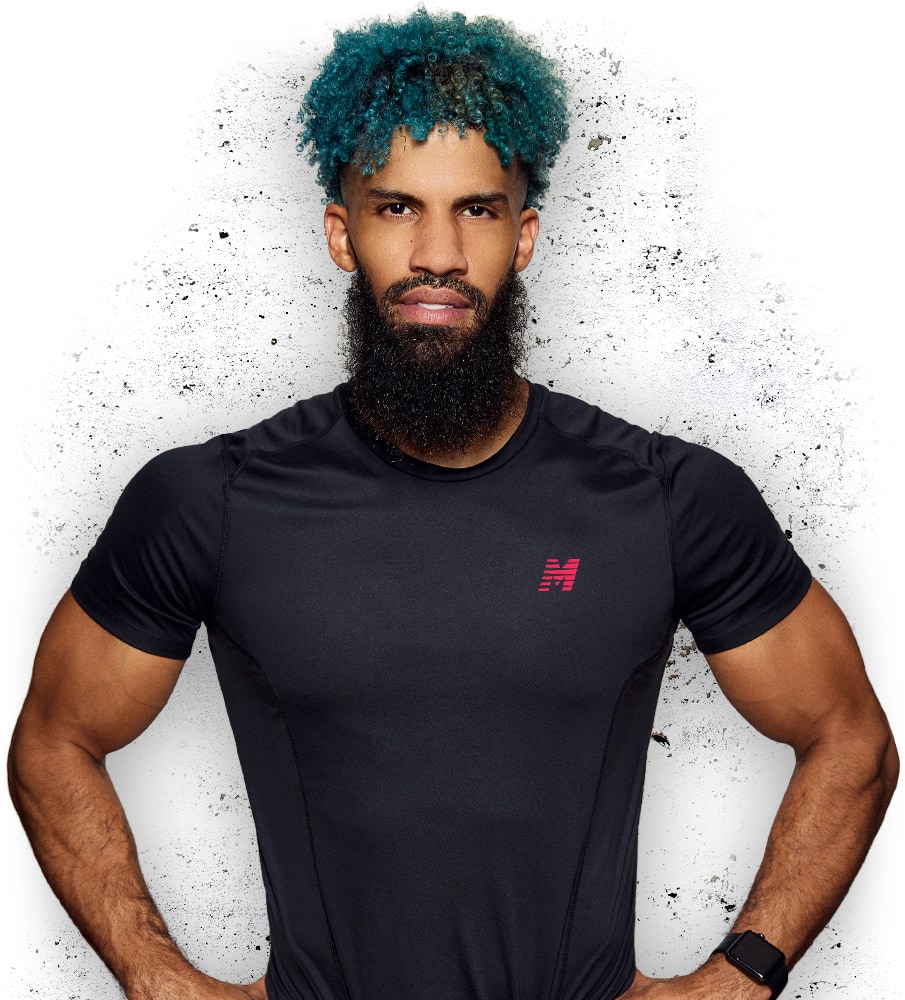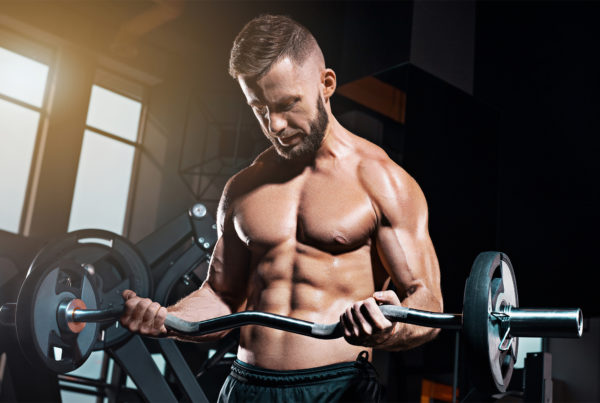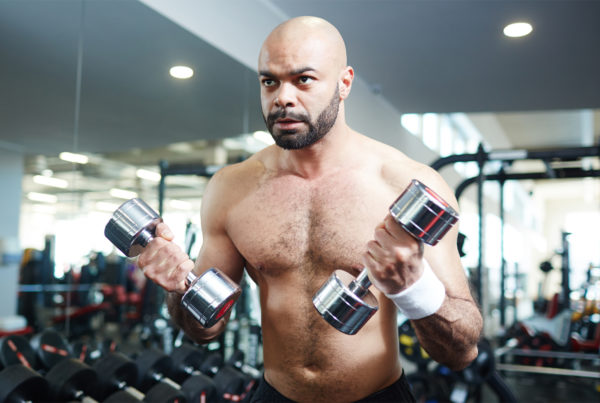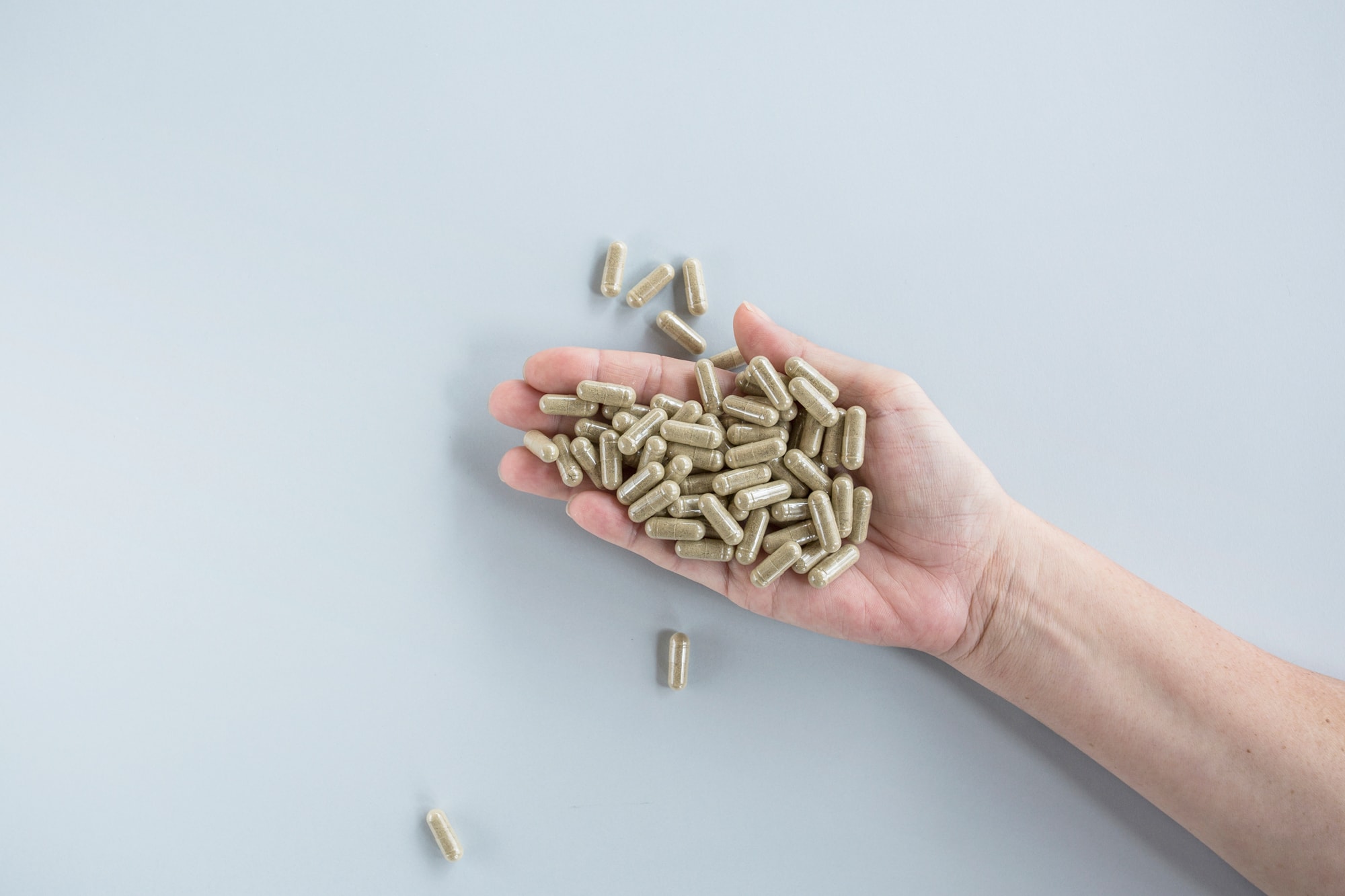
There are so many health and workout supplements to choose from: Take this pill 3x per day and get abs in 30 days! Mix this powder with water, juice, or milk and look exactly like the person on the container… GUARANTEED! Of course, it never works like that in real life. So, are all workout supplements a waste of your time and money?
The Short Answer:
For the most part… yes. There are, however, two supplements — protein and creatine — that, when used correctly, may prove to be beneficial to you on your health and fitness journey. However, even then, whether or not they actually will depends on a number of factors, which we will discuss here in full detail.
Do Yourself a Favour… Save Your Money
Seriously! If you’re taking any workout supplements other than protein or creatine right now, throw them in the garbage immediately; OR if it makes you feel any better, go ahead and finish them out, only to never buy them ever again of course.
I’ve literally spent THOUSANDS of dollars on health and workout supplements in my lifetime. I’ve taken almost EVERY single natural supplement known to mankind:
- protein powder (every kind)
- BCAAs (pick your flavour)
- creatine monohydrate
- multivitamins
- pre-workout / caffeine
- glutamine
- carnitine
- HMB
- ZMA
- beta-alanine
- green tea extract
- fish oil
… and the list goes on.
Today I solemnly swear to tell the truth, the whole truth, and nothing but the truth regarding supplements, so help me God. ✋
Trust me: you won’t find this type of honesty anywhere else on the internet.
By the end of this article, my hope is that you’ll learn why 99.9% of supplements are a waste of money, how to determine whether or not protein and creatine are right for you and your fitness goals, and how to use them correctly IF you decide to utilize them.
When you’re done reading, leave a comment down below to let me know if I succeeded with that. And if I didn’t, let me know that too; I wanna know exactly why. 😃
Here’s exactly what we’ll cover in this article:
As always, feel free to use the navigation box above to skip ahead at your leisure.
The Purpose of Using Supplements
Before we even begin, let’s try to understand something here:
Why are we even taking supplements to begin with?
I mean, besides the fact that supplements are — quite literally — being forced down your throat by this multi-billion dollar BEHEMOTH of an industry…
Have you ever really given it any serious or real thought?
No? Well, let’s do that then, shall we? 😄
Supplement Breakdown
By definition:
sup·ple·ment
/ˈsəpləmənt/
noun
something added to complete or enhance something else, supply a deficiency, or reinforce or extend a whole.
The very definition of the word “supplement” spells out three very obvious and important things for us right from the get-go:
- Supplements are merely an “additive” to all of the hard work that is already happening within our training and nutrition program
- Supplements are only ever needed IF and WHEN we determine there is some sort of “deficiency” present in the first place
- Supplements are meant to “enhance” something else, and if they don’t actually do this, they’re pretty much entirely useless
Do You Already Have a Solid Fitness Program?
Serious question. ☝️ And if you’re stammering right now, the answer is obviously no. 😄
If you’ve been involved in health and fitness for any serious amount of time, then you’ve likely heard at least one of the following three gospels:
- Diet is worth 70–80% of your results and training is worth the other 20–30%.
- You can’t out train a bad diet.
- This is a marathon, not a sprint.
What the heck does all of this have to do with supplements?
- If diet is worth 80% and training is worth 20%, supplementation is worth 1% or less.
- If you can’t out train a bad diet, you’re not going to “out supplement” one either.
- Stop looking for a way to get “instant results”. There’s no such f#$%in’ thing!
You have to get your nutrition and training program in check FIRST (in that order)!
And if this is something you’ve honestly just been struggling with, we can help:
Apply for Coaching TODAY!
Because yesterday you said tomorrow.
The Bottom Line:
Be realistic! Get your health and fitness program in check before you even consider using ANY health or workout supplements.
Have You Identified a Nutrient Deficiency?
So you’ve decided that your diet and training is in order? Okay cool! Well, now I’ve got another question for you:
Why are you even using supplements in the first place?
You wouldn’t just start taking an iron supplement, for example, “just because”, right? Likely your doctor would have given you a valid reason to, along with a prescription for it.
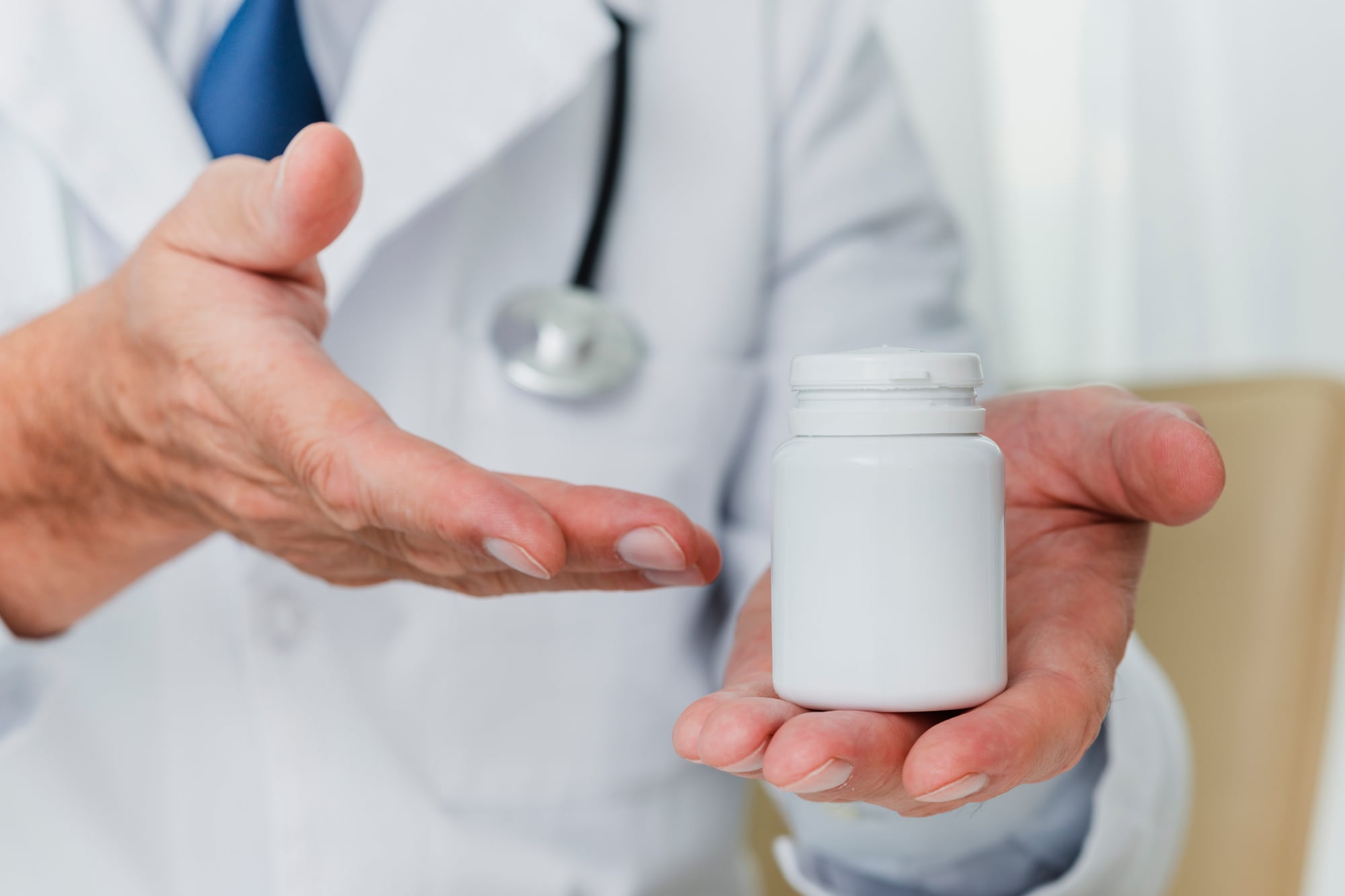
And just like you might purchase vitamins to support a diet that is lacking in certain micronutrients, workout supplements should be taken in a very similar fashion.
Ask yourself: “Are these supplements actually helping me fill a REAL void?” OR are you doing what most people do… taking them just for the hell of it — or worse, rapid results?
And be honest! You’d be surprised at how many people answer this question untruthfully because they’re literally brainwashed by the supplement industry.
Just as people develop addictions to buying clothes, the same thing can happen with supplements. How do I know? This used to be me! 🙁
Do the Supplements You Use Actually Work?
I remember when I started working out in my teenage years and just how excited I was cracking open my very first tub of protein!
I vividly remember thinking to myself, “I’m gonna take this weight gainer, work out like crazy, and turn into a f#$%in’ BEAST! This is going to be great!” 💪
In reality, I ended up taking all SORTS of different weight gainers, worked out like a complete idiot, and wound up turning into a butter ball. 😄
Seriously though, ask yourself: “Are these supplements getting the job done? Are they delivering on all of the ridiculous promises printed on the labels?”
For 99.9% of supplements on the market, the answer is going to be a big fat NO.
Supplement #1: Protein Powder
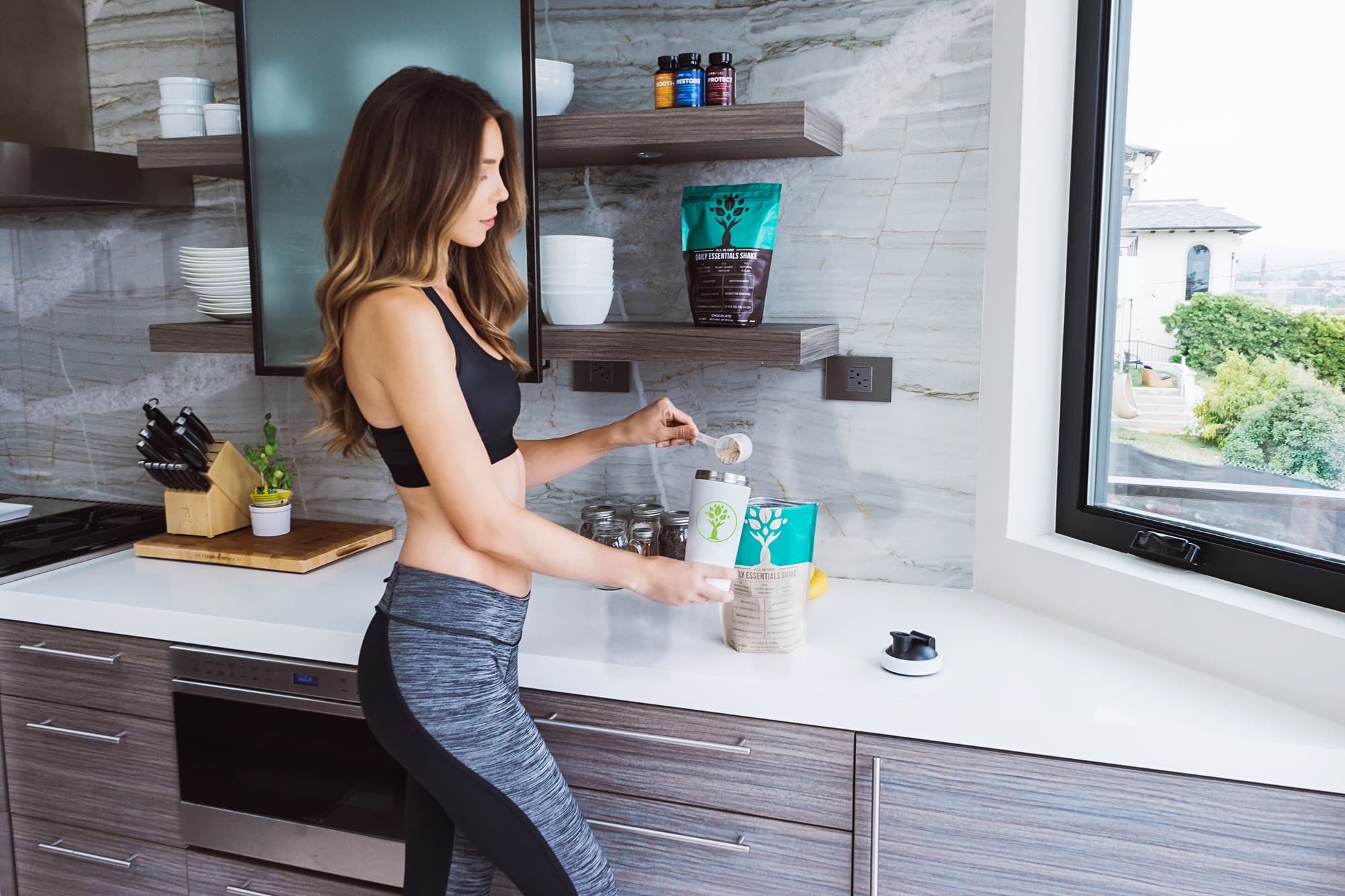
Yup! I’m recommending protein powder as the #1 supplement you should actually consider buying. No brainer, right? Well, not really. The keyword here is “consider”.
Protein powder isn’t exactly for everyone. For starters:
- Most people can easily get enough protein simply from the foods that they eat. If this is the case, there is absolutely no need to supplement with protein powder.
- Some people are extremely sensitive to this stuff and have all sorts of digestive issues when consuming it (upset stomach, bloating, diarrhea, flatulence, etc.)
- Some people don’t have “building loads of muscle” at the top of their priority list, which means their protein requirements will actually be pretty low and they DEFINITELY don’t need to use protein powder.
How Do I Know If Protein Powder Is Right for Me?
There’s only ONE logical reason why you’d need to supplement with protein powder:
You’re not getting enough protein from the foods you’re eating.
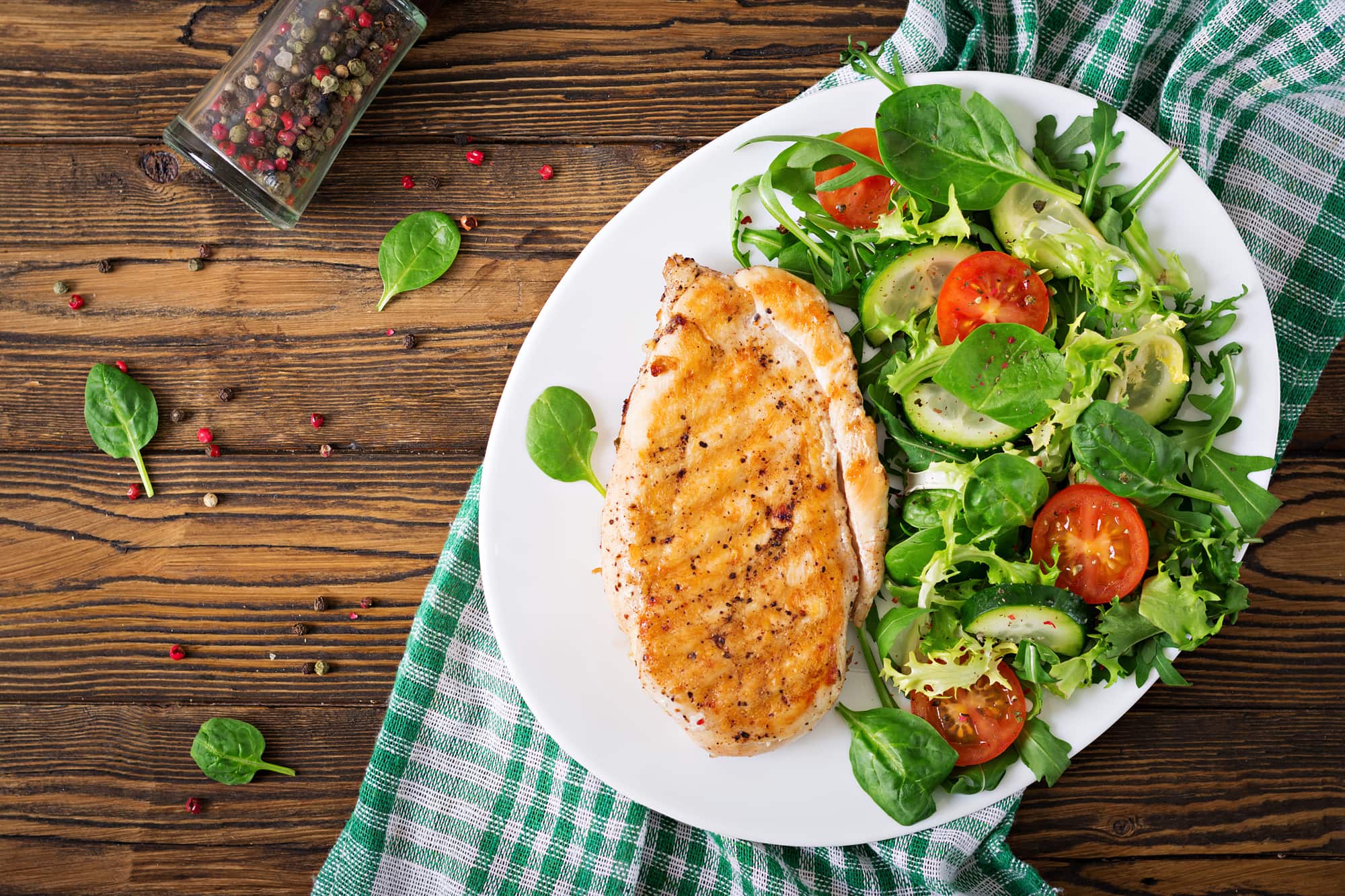
Pretty simple stuff, right? 🙂
If you are getting enough, then you have absolutely no need to supplement with protein powder. End of story. Stop buying (or considering) it effective immediately.
If you aren’t, click here to skip ahead and figure out which one is best for you.
If you’re not sure, then we should probably figure that out… starting with your calories. From there, we can determine the exact amount of protein you should be consuming based on your current fitness goals.
Sound confusing? Use our free Calorie Calculator. 👈 It’ll tell you the EXACT amount of calories to consume each day to hit your goal — in less than 60 seconds.
Calorie Calculator
Wanna know exactly how much protein you need to eat to for your fitness specific goal? We’ve got a calculator that does that for you!
And not only that, it’ll give you your macronutrient breakdown as well, which includes: protein, carbs, fat, and water. You’re welcome! 🙂
Once you’ve figured out your calorie target and macronutrient breakdown, next, you’ll have to track the calories you’re eating to determine whether or not you’re actually hitting your protein target.
If you are, keep eating food; if you’re not… start shopping for a protein powder.
How Much Protein Should I Be Consuming?
After using our calorie calculator, a lot of people end up reaching out to us asking the following: “Your calculator is telling me to eat only XXX g of protein. This seems pretty low; is this correct?”
The answer is YES.
You don’t really need as much protein as everyone seems to think.
And there’s a good reason why most people are so confused about this in the first place and, of course, the fitness industry is to blame.
The general rule that most people are taught to use — 1 g of protein per 1 lb of body weight — is actually a load of horse s#!%.
And when you think about it logically, you’ll see that it’s merely a ploy that the supplement industry utilizes to — you guessed it — sell more protein powder.
The Bottom Line:
If you’re able to hit your protein target with the foods you eat, you do NOT need to include protein powder as part of your supplementation strategy.
Which Protein Powder Should You Use?
If you’ve figured out that you DO, in fact, have a protein deficiency and need to utilize a protein supplement to fill the void, then the next reasonable question would be, “Which one is the best?” or “Which one is right for me?”
If you’re new to the world of protein powder, this might shock you a bit because there are a LOT of different options to choose from. Let me enlighten you:
- hydrolyzed whey protein
- whey protein isolate
- whey protein concentrate
- New Zealand whey protein
- casein protein
- egg white protein
- beef protein isolate
- soy protein
- hemp protein
- pea protein
- brown rice protein
- protein blends
I’ve literally tried every single one of these. Why? Well, I was vegan for almost 2 years, vegetarian for another 4 years, and pescetarian for another 2 years.
So, there used to be a time where soy, pea, hemp, and brown rice protein were my only options! I definitely don’t miss THOSE days (they don’t taste so great)! 😄
Anyway, getting back to my point: I know my protein powders.
For starters, if you’re not a vegan or a vegetarian, your first pick is always going to be whey — point, blank, period.
- It’s more affordable since the market is much bigger
- It usually tastes much better; although there are definitely exceptions
Now, with SO many whey proteins to choose from, which one is the best?
Well, despite all of the marketing, if you wanna know the truth — which I’m sure you do — they all accomplish the exact same thing: supplementing your protein intake.
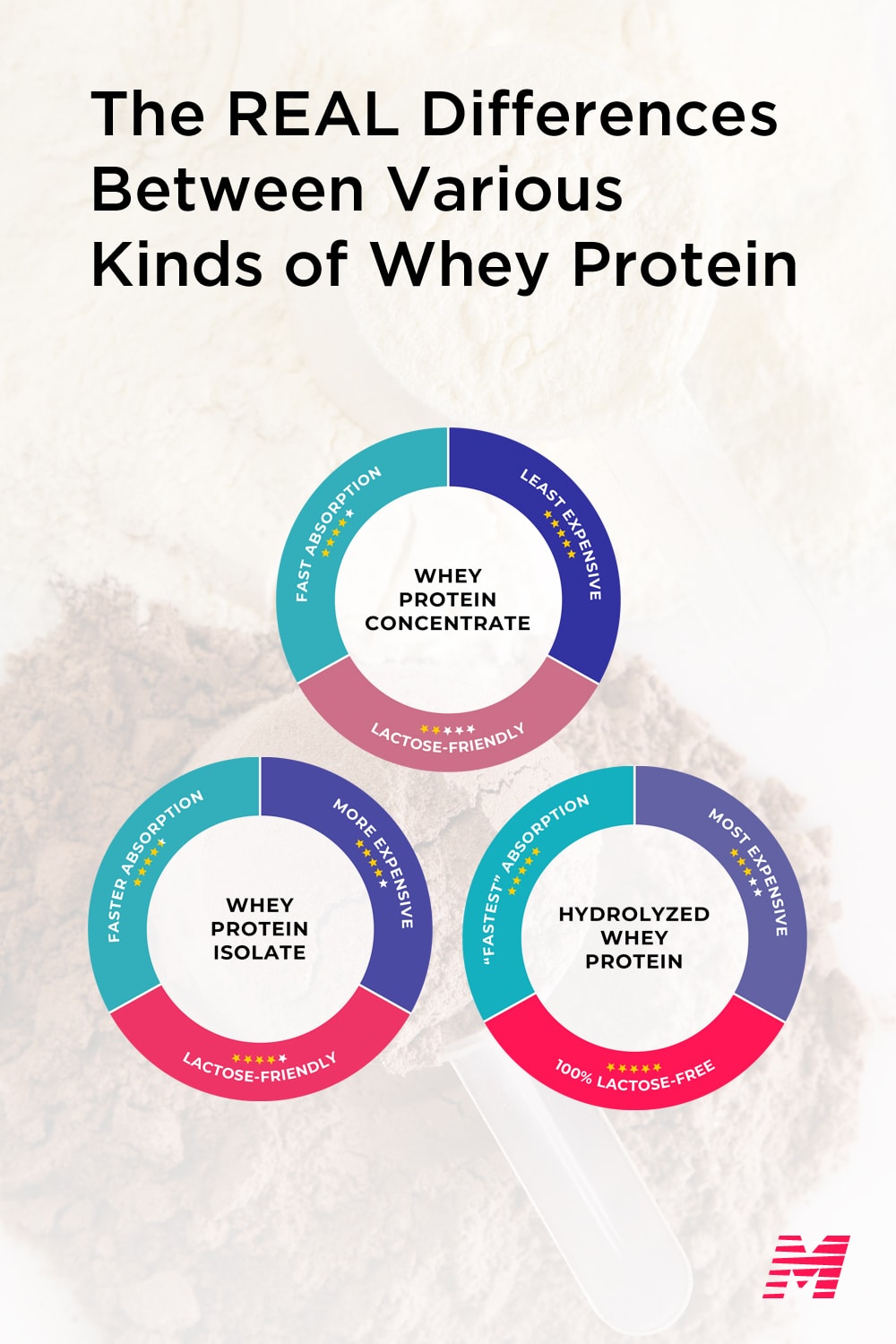
This infographic says it all! ☝️
The best protein powder for YOU really depends on one thing and one thing only:
- your stomach’s tolerance level to lactose
Whey Protein Concentrate
If you’ve got zero stomach issues when it comes to lactose, then whey protein concentrate is the way to go — period. It’s the cheapest whey you can buy, usually the best tasting, and provides the EXACT same benefit as the others: more protein.
Win-win-win.
Whey concentrate contains around 70–80% protein and as well as lactose and fat. 1 scoop contains 22 g of protein and around 2 g of carbs and fat.
Whey Protein Isolate
If your stomach is on the sensitive side, then whey isolate is the next best option.
It’s a little bit more expensive, but if you’d rather not battle stomach issues and you don’t want people asking you why you smell like fart bombs, you’ll have to deal with it. You’re gonna have to “pay the price” one way or another. 😄
Whey isolate protein removes almost all of the unwanted fats, carbs, and lactose. 1 scoop contains 25 g of protein and trace amounts of carbs and fat.
Hydrolyzed Whey Protein
This stuff is marketed as “the best whey protein money can buy” with an outrageously high price tag to “prove it”. All of the added “benefits”, however — faster absorption and increased protein synthesis — are stupid and pointless. 😑
Again, protein powder serves one purpose: to add more protein to your diet.
In reality, it’s practically identical to whey protein isolate. The ONLY reason to buy this over the first two options is if you’re hyper-sensitive or completely lactose-intolerant.
Hydrolyzed whey protein contains no unwanted fats, carbs, or lactose. 1 scoop contains 25 g of protein and nothing else.
Hey! What About the Vegans and Vegetarians?
I could never forget about you guys (and gals)! There will always be a special place in my heart for my plant-eating friends. 🤗❤️
The major key for you all is this: you’ve gotta mix it up.
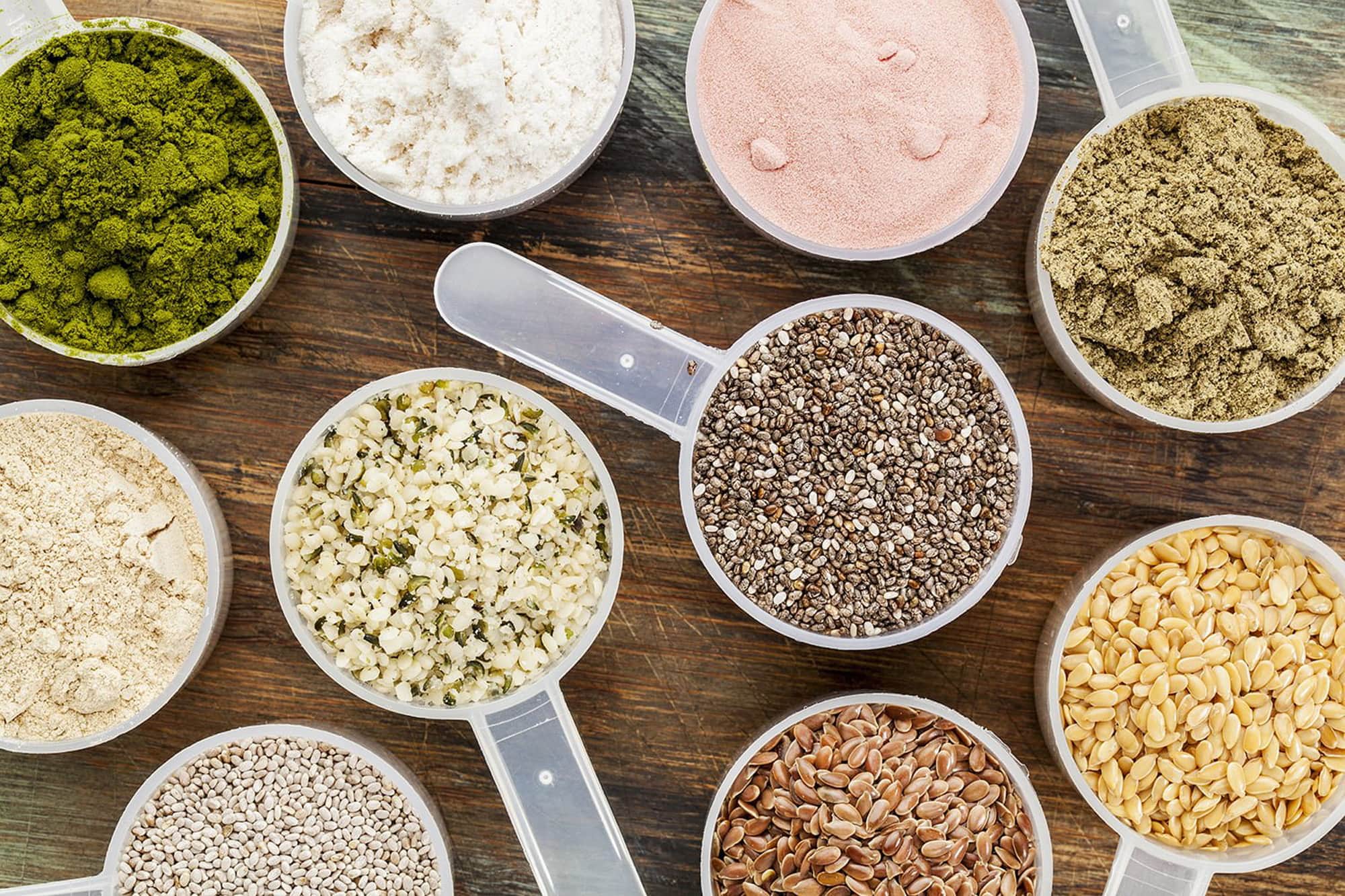
With the exception of soy and quinoa, plant proteins are usually pretty low in one or more essential amino acids. This isn’t really a problem if you’re on a very sound vegan/vegetarian diet and regularly eating a variety of different plant foods.
If you’re not, however, the wisest thing you can do is utilize a few different plant-based protein powders OR purchase a single product that utilizes a balanced blend of multiple plant proteins.
The most effective powders to look out for are as follows:
- Pea protein
- Hemp protein
- Brown rice protein
- Soy protein
- Protein blends
Also, as we discussed with the whey proteins, pay attention to what “agrees” with you most. If you sense any sort of stomach issues, stop taking the product immediately.
The Bottom Line:
Vegan and vegetarian protein powders are just as effective as whey protein powders in supplying your body with essential amino acids.
How Exactly Am I Supposed to Use This Stuff?
There are really only two common questions to address here:
“How much should I take?”
As previously discussed, only as much as you need to balance out your protein deficiency. Remember, protein powder shouldn’t become your main source of protein; it’s always better to eat protein-rich foods instead.
My Recommendation:
Take 1–2 scoops daily, only as necessary, and as per your specific needs.
“What should I mix it with?”
Whatever you want! I’ve personally used all of the following:
- milk (any kind)
- almond milk
- cashew milk
- coconut milk
- oat milk
- rice milk
- soy milk
- water
- smoothies
- yogurt
- oatmeal porridge
- pancake batter
- cookie dough
- cake batter
… and the list goes on.
Also, if you’re not a fan of the taste, it works absolutely GREAT in smoothies. Just be sure to stick with a plain flavour like vanilla. Although chocolate works great with things like banana and peanut butter, it’s not as versatile otherwise.
Speaking of which… Are you in need of some AWESOME recipe ideas? Upgrade your smoothie game instantly with this: The Meal Replacement Smoothie Handbook. 👈
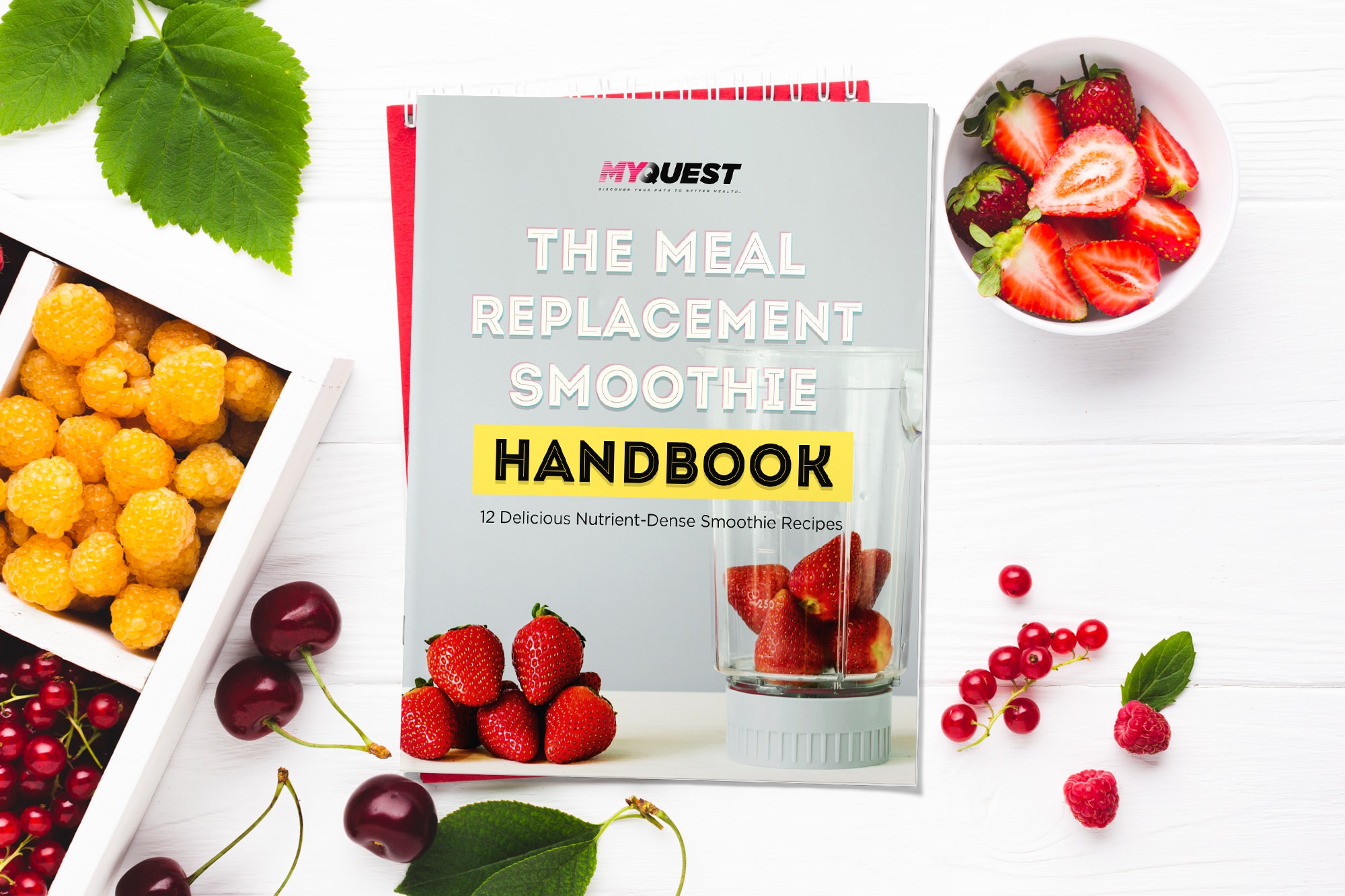
Make Protein Shakes That Don’t Suck
The Meal Replacement Smoothie Handbook provides you with 12 delicious nutritious recipes that are sure to satisfy your taste buds.
We 100% respect your privacy and will never, EVER, share your personal information or spam you — no B.S.
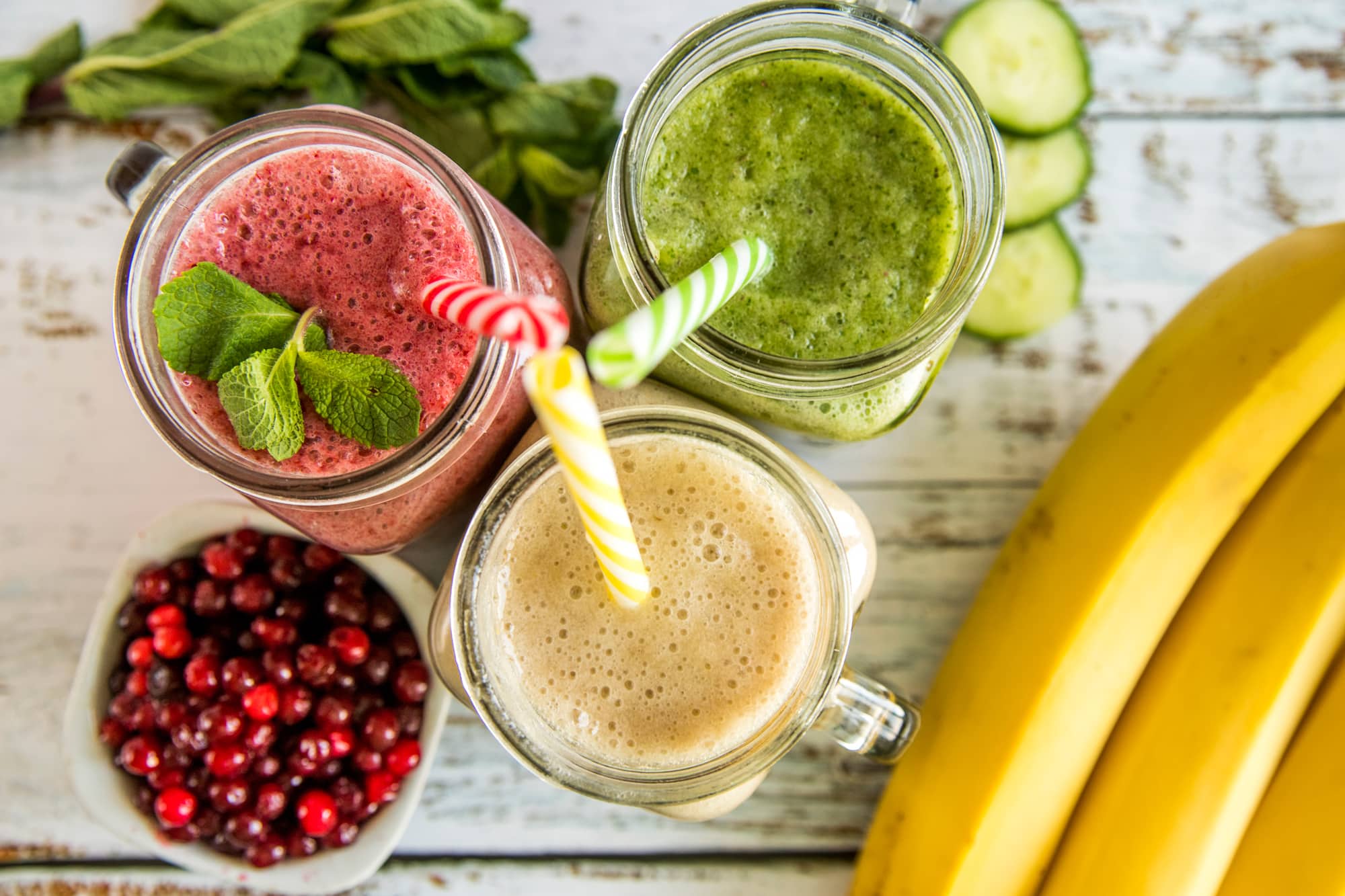
A word of advice: Protein powder doesn’t really play well with heat. So, you’ll have to experiment with various protein powders (maybe even combinations) when it comes to adding it to things like porridge and pancake mix, and when you bake with it.
My Recommendation:
Honestly, just mix it with whatever is most pleasing to your taste buds.
“When exactly should I take it?”
I’m sure you’ve heard at some point or another that there are two very important times to consume protein, especially protein shakes:
- right before you work out
- right after you work out
Though there is definitely evidence to support that proper nutrient-timing can produce optimal absorption of nutrients within the body, it’s just not important enough to worry yourself over.
This is a common theme among beginner and intermediate fitness folk; it’s called “majoring in the minors”.
Don’t sweat the little stuff; it doesn’t matter as much as you think.
If you can get a protein shake in a few hours prior or after a workout, awesome! If you can’t, you’re not going to lose out on any gains — trust me.
My Recommendation:
Take it whenever you can; just be sure that you’re hitting your protein targets.
Supplement #2: Creatine Monohydrate
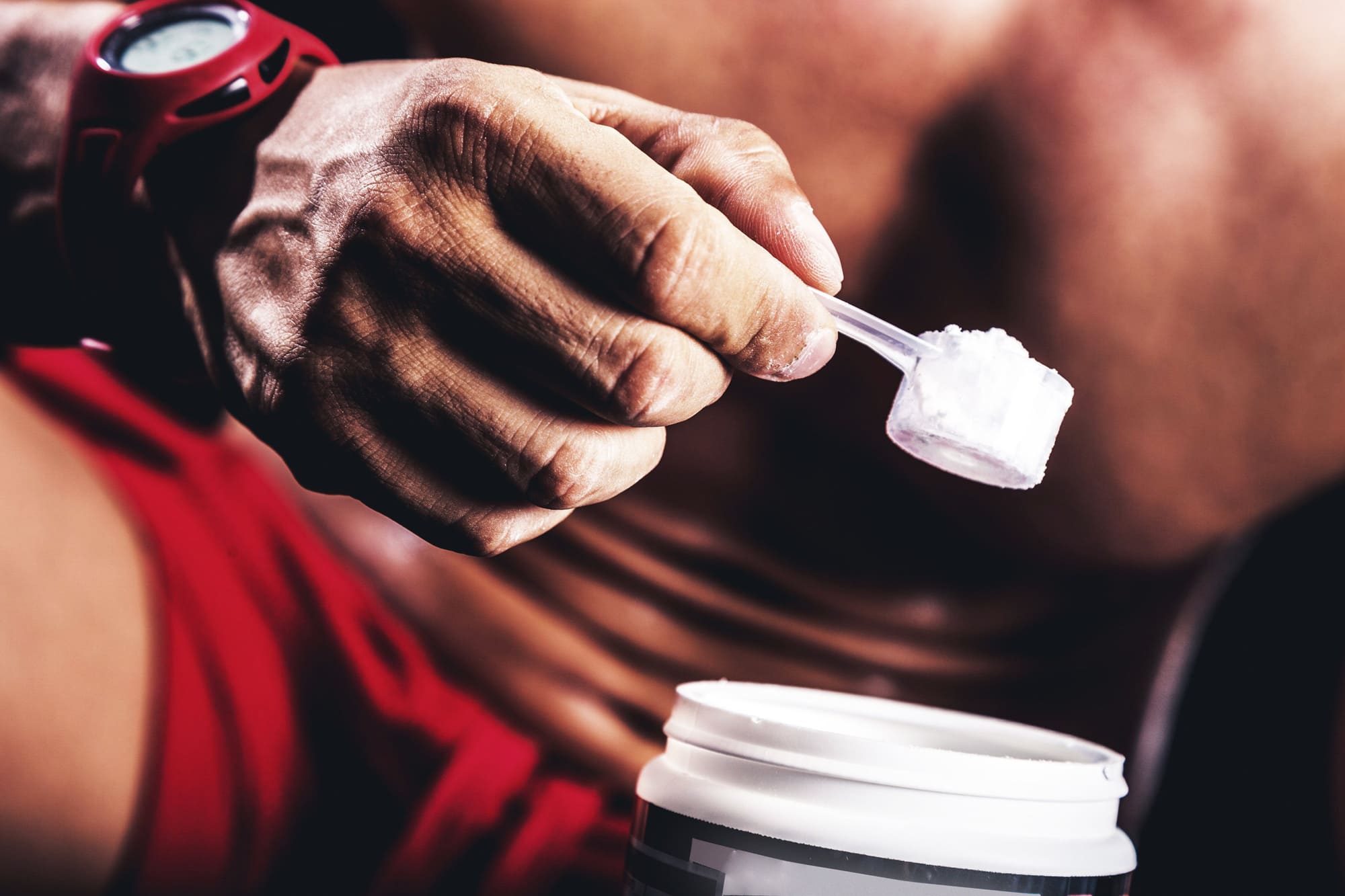
I’m recommending creatine as the second, and final, supplement you should actually consider buying. Again, the keyword here is still “consider”.
Firstly, if you didn’t already know, creatine is already naturally present in your muscle cells. It is A) something that the body can create itself; and B) also found naturally in protein-rich foods like meat, eggs, and fish.
Unfortunately, to get the maximum effective daily dose of creatine from food, you’d have to consume HUGE amounts of meat and/or fish daily.
Hench, where creatine monohydrate as well as other forms of creatine supplements come into the picture to maximize your intramuscular creatine stores.
The benefits of this supplement have stood the test of time. Creatine monohydrate should be a staple in any strength trainer or high-intensity athlete’s supplement strategy.
Supplementing with creatine gives you a noticeable increase in strength, power, and endurance by storing excess creatine within the muscles so you have quick access to it for fast high-intensity movements like strength training, sprinting, powerlifting, etc.
Some of the potential benefits of creatine supplementation include:
- increased physical performance during max effort lifts
- increased anaerobic threshold and training capacity
- increased single and repeated sprint speed
Confused? More strength, more power, more endurance, more energy. 😉
In addition, as long as you have normal healthy kidney function and drink an adequate amount of water, there are absolutely no known side effects to using creatine.
Seriously, creatine is backed by DECADES of research. It is easily the longest studied, most effective, and safest workout supplement available on the market. Period.
With that being said, as is the case with protein, creatine isn’t for everyone.
How Do I Know If Creatine Is Right for Me?
This one’s just as simple. Consider the following questions:
- Are you trying to increase your overall muscle mass?
- Are you trying to increase your overall strength?
- Are you trying to increase your overall power?
If you answered yes to any of the above, creatine is right for you.
And no, ladies, creatine doesn’t turn you into a bulky superhuman muscle monster; that’s what steroids does. So, creatine is perfectly suitable for women as well.

In fact, the only reason you shouldn’t use creatine, is if you’re a “non-responder”.
How Do I Know If I’m a Non-Responder?
As with most things in life, some individuals respond more positively to creatine supplementation than others. In some cases, many individuals — it’s estimated to be around 30% — do not seem to experience any noticeable benefits at all.
Personally, I’m a “responder”. I know this for a fact only because I’ve been testing my own performance in the gym for years with and without the use of creatine.
To find out whether or not YOU are a non-responder, you’ll have to do the same. 🙂
Luckily, testing is easy and the rules are actually quite simple:
- Begin a strength or resistance training program and remain consistent for anywhere from 6 to 8 weeks.
Note: If you’ve already been working out for a while now (without the use of creatine), that’s even better since you’ll have likely already hit a noticeable plateau (skip to step #4).
- During this time you’ll be working out using your maximum level of effort WITHOUT the use of any supplements (no creatine).
- Chart all of your numbers (reps, sets, and rest) so that you’re able to gauge the progression of your strength and endurance during your 6–8 week training program.
- At the end of 6 to 8 weeks, start supplementing with creatine and continue training for another 6 to 8 weeks.
Note: It’s important to keep your training program EXACTLY the same; use all of the SAME sets, reps, rest, and exercises.
- Once again, during this time you should aim to continue working out using your maximum level of effort.
- Chart all of your numbers (reps, sets, and rest) over the course of the next 6 to 8 weeks. In addition, begin paying close attention to how you feel while working out.
- At the end of the second training cycle, compare all of the numbers!
It’s really that simple. 🙂
Once it’s all said and done, one of two things is going to happen:
- Nothing will change — Your progressions will look exactly the same, you’ll feel exactly the same, and there will be no noticeable difference in any of the numbers.
- Everything will change — Your reps before failure will increase dramatically (somewhere between 20–30%) and your strength will increase substantially faster week-to-week compared to the non-supplemented training cycle. Overall, there will be a noticeable difference in your overall performance, strength, and endurance
This should go with out say, but if nothing changes at all, you’re a non-responder; if everything changes, then creatine is DEFINITELY right for you.
Which Type of Creatine Should You Use?
If you’re relatively new to the world of creatine, much like with whey protein, there is what seems like a gazillion different types of creatine available on the market:
- creatine monohydrate
- creatine hydrochloride
- creatine magnesium chelate
- creatine citrate
- creatine malate
- buffered creatine monohydrate
- creatine gluconate
- creatine pyruvate
- creatine alpha-ketoglutarate
- creatine blends
Yeah! No s#!%! You thought I was kidding? 😄
Now, unlike with the various protein powders that are available on the market, I have NOT tried every single one of these. Why? Because I care about my health. 😳
I mean… some of these types of creatine I can’t even pronounce properly.
Also, as far as the research is concerned, creatine is creatine, and the original creatine monohydrate is simply the people’s champ. It is also regarded as the most “natural” form of creatine, which is something I like.

In addition, it’s the most scientifically researched creatine on the market, meaning all of the published studies proving the benefits of “creatine” (and its lack of any negative effects) are based on the use of “creatine monohydrate”.
Finally, as with the whey protein concentrate, in most cases, creatine monohydrate is the cheapest type of creatine you can buy.
And in case you’re wondering, “Maybe I’m not a non-responder when it comes to creatine monohydrate, but this other stuff might work!”
Again, as far as the research is concerned, “creatine is creatine”.
But hey! If you’re feeling a little experimental, give them all a try and let me know your individual findings down below in the comments. 😄
How Exactly Am I Supposed to Use This Stuff?
Let’s get to the four most frequently asked questions:
“How much should I take?”
The most commonly recommended dose is 5 g per day, which I think is a good guideline. If we’re getting technical, depending on your total muscle mass, your body could potentially benefit from more than this amount.
In addition, your muscles utilize stored creatine when you — you guessed it — use your muscles, so it may be advisable to up your dosage a little bit higher on training days to keep your muscles fully saturated for your next workout.
If you’re already confused and want to keep things simple, stick with 5 g per day. 😄
Otherwise, if you want to get technical and maximize your results…
My Recommendation:
Take 3–10 g per daily, as per your specific needs and training schedule.
“When exactly should I take it?”
I’m using my experience to answer this question. Personally, I’ve heard everything from:
- first thing in the morning
- pre-workout
- intra-workout
- post-workout
- right before bed
- throughout the day
Here’s the thing: Creatine has a compounding effect within the body, meaning maximum saturation is going to occur over the course of several days, regardless of when you take it. What matters more is that you consistently take it.
My Recommendation:
Take it whenever you can; just be sure to take it daily.
“Should I do a preload phase?”
Some time ago, there used to be this common trend of people “preloading” their bodies with creatine by taking 20 g per day for 5–7 days and then reducing the dosage to a maintenance level thereafter — 3 to 5 g.
This is meant to saturate the muscles with creatine more quickly versus standard daily dosing. Here’s a visual graph to help you understand the concept a bit better:
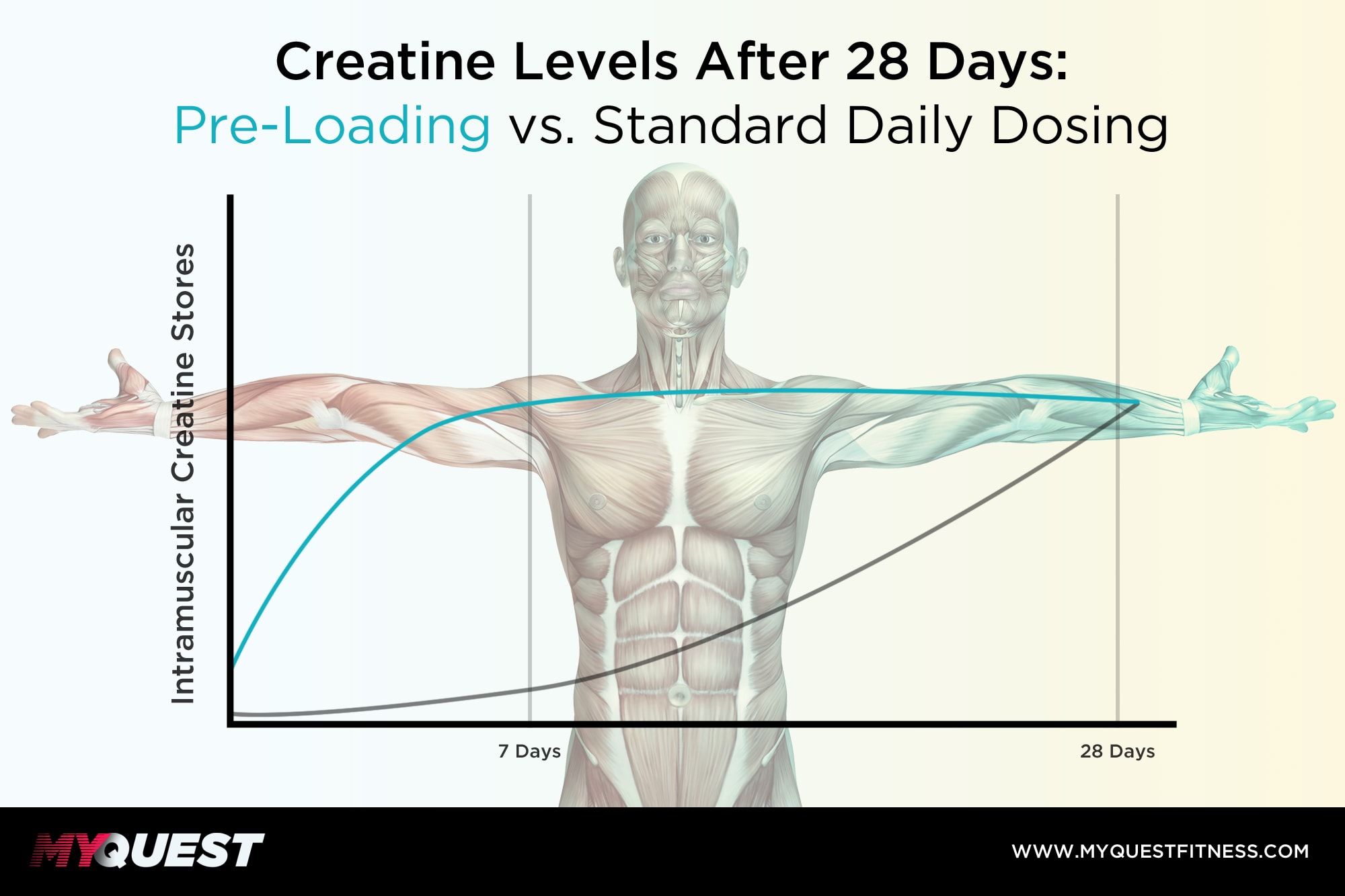
I’m sure there are people who still do this, but personally I think it’s a waste of creatine. Also, I recall getting diarrhea when I used to do this in the past; your results may differ. 😄
If you really think about it, what’s the hurry? Secondly, creatine is perfectly safe to use every day for the rest of your life. So, as long as you’re active, you’ll probably be supplementing with this stuff. So, I ask again, what’s the hurry?
Preload or not, your muscles will eventually become fully saturated.
My Recommendation:
Skip the preloading phase and save some of your creatine supply.
“Should I take it with juice?”
There is also this idea floating around that you MUST consume creatine with an insulinogenic beverage (a drink that’s high in sugar and spikes your insulin level) such as fruit juice — otherwise it won’t be absorbed efficiently by the body. 🤨
Well, I don’t ever take creatine with juice — mainly because I don’t drink juice — and I’ve been reaping the rewards of creatine supplementation for YEARS now.
Unfortunately, based on my experience, I’m going to have to call bulls#!t on this one too.
My Recommendation:
Honestly, just mix it with whatever the heck you have available.
What About Everything Else?
As I said at the beginning of this article, they’re a complete waste of time and money.
In the event that you’re still not convinced, let’s briefly dive into a few favourites:
Multivitamins
Stupid.
Eat a solid variety of protein such as meat, fish, etc. (or things like lentils, beans, chickpeas, etc. for my plant-based eaters), carbohydrates (whole grains, fruits, veggies, etc.), and fats (nuts, avocado, olive oil, etc.).
That’s where all of the micronutrients are at, my friend! Not in a pill. 😐
Fish Oil
Eat a good source of fatty fish (salmon, mackerel, tuna, sardines, etc.) 2–3x per week instead. If you’re a vegan or vegetarian (or you’re not a fan of fish), you’ll find your omega-3s in things like flaxseed, chia seeds, and walnuts.
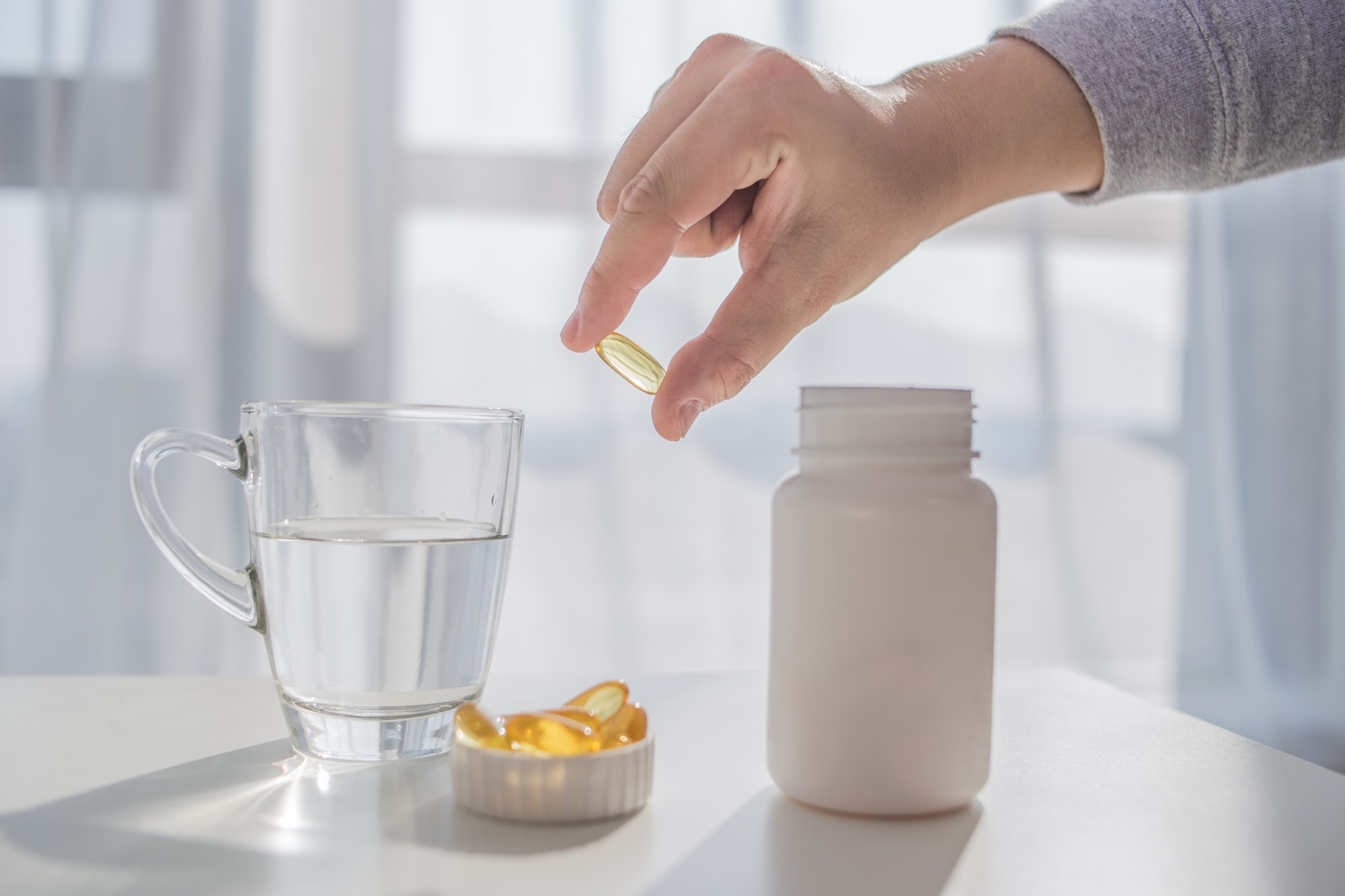
Pre-Workout Powders
Stay away! These things are loaded with so much garbage, it’s unreal.
The not-so-secret ingredient and main stimulant in pre-workout powders that gets everybody so fired up is caffeine. If you’re a coffee-lover, which most people are, just have a cup of coffee or an espresso instead. ☕
You can even add some sugar for a pre-workout energy boost.
If you don’t drink coffee, a bottle of caffeine pills costs $10. That’ll be substantially more cost effective than any pre-workout powder on the market. 😉
Glutamine
Pointless.
Glutamine is already present in all of the foods you’re eating that are high in protein. And if you’re supplementing with protein powder, there’s more glutamine in there too! Taking additional glutamine would be totally redundant.
Branched Chain Amino Acids (BCAAs)
Pretty much the same answer as above. ☝️
With that being said, I’ve actually had great success supplementing with BCAAs under very SPECIFIC circumstances, which is totally beyond the scope of this article.
That is to say then, for most people under most circumstances, BCAAs — which, by the way, are very expensive and extremely overpriced in my opinion — are simply not worth the return on investment.
Everything Else
I think you’re beginning to get the point. 🙂
Need Some Help With Your Program?
Are you realizing that a sound health and fitness program is a little bit more than just adding a few worthless supplements into the equation?
Not sure where to begin? Let us help you discover your path to better health.
In our MyQuest Coaching program we perform a comprehensive needs assessment and then build you a fully-customized fitness program tailored to your every need.
This also includes the implementation of a sound nutrition plan and supplementation program utilizing all of the principles that we discussed here today.
If this sounds interesting to you, click one of the buttons below to get started:
Apply for Coaching TODAY!
Because yesterday you said tomorrow.
Final Thoughts
To recap, there are only two workout supplements that are worth your money:
- protein powder
- creatine monohydrate
If you’re currently utilizing anything else, finish off your supply and keep it moving.
Don’t follow in my past footsteps, and the footsteps of so many others who are so lost on their journeys, by turning to supplements for fast results.
I promised to tell the truth, so here it is: you have to put in the work.
No amount of pills or powders will counteract the negative effects of a poorly developed fitness program, unhealthy eating habits, or a lack of effort in the gym.
Build a sound program as your foundation and follow through on that first. Sprinkle in some protein only if you’re deficient from the foods you’re eating. And factor creatine into the equation if you’ve determined that it’s in line with your goals, you’re a “responder”, and you’re looking for an added boost in the gym.
I’m interested: What are your thoughts? What kinds of supplements have you taken in the past? Which of them are you still taking now? Why? How are they working out for you? Good, bad, or negligible? Leave a comment down below and let me know!


